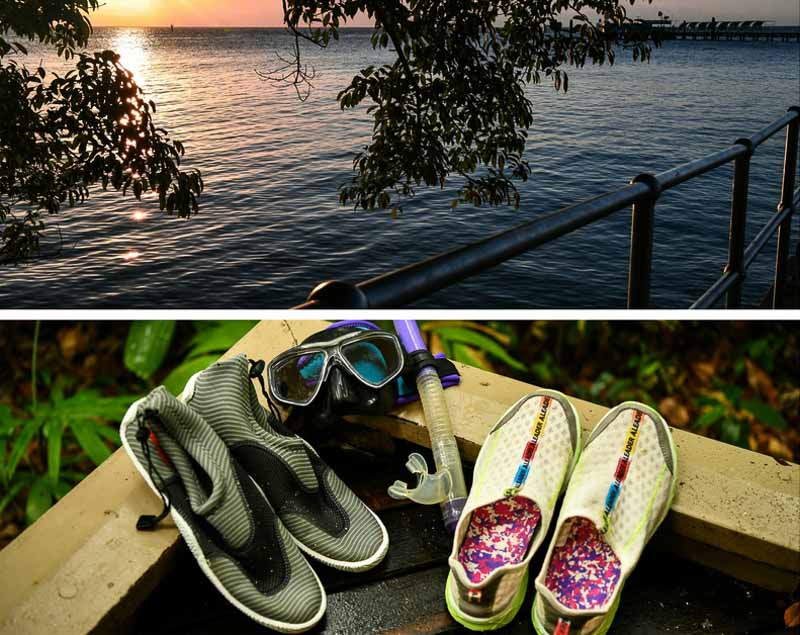Green Island and Fitzroy Island are two islands on the Great Barrier Reef close to Cairns. Just 25 to 30 km offshore, a catamaran or ferry takes just under an hour from the Reef Fleet Terminal in Cairns.
Of all the places to visit in Queensland, if you want to visit the Great Barrier Reef and experience all it has to offer, an island stay is a good option.
The Great Barrier Reef (GBR) is the world’s largest coral reef and one of the seven wonders of the world, stretching for 2600 km along the east coast of Australia and comprises of over 3000 reef systems and 900 tropical islands.
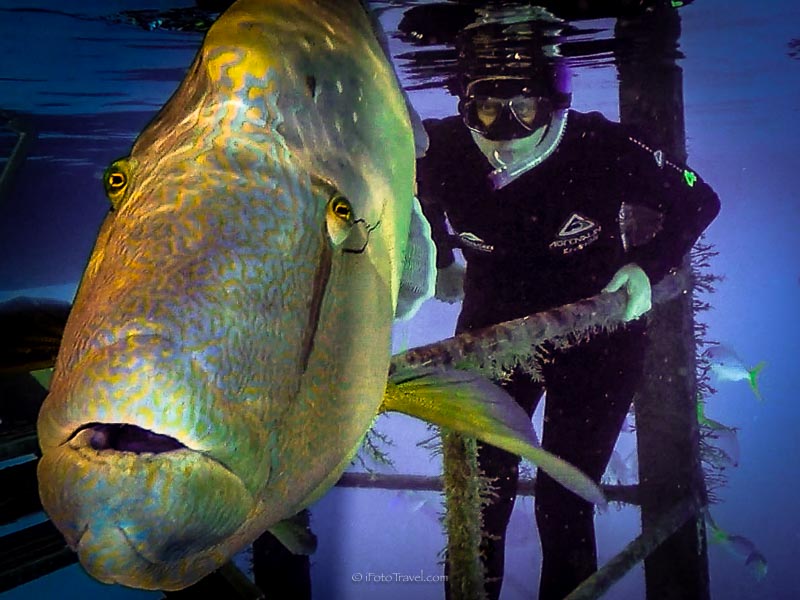
Green Island vs Fitzroy Island
The proximity to Cairns makes a day trip to Green Island or Fitzroy Island very feasible.
What is the difference between them and how do you choose which one to visit?
Perhaps we should first look at their similarities.
As a day trip destination, both are surrounded by in-shore reefs.
This means lovely tropical beaches, safe swimming and snorkelling, with windsurfing, stand up boards, kayaks, glass bottom boat tours and scuba diving also on the activity list.
Both islands offer day trips to the Outer Reef as well but they also have many differences giving you a completely unique experience.
Let’s look first at Green Island.
While visiting Tropical North Queensland, you’re likely to spend some time in and around Cairns. If you’re a wildlife lover, check out the baby megabats and microbats at the Tolga Bat Hospital and the fabulous Cairns Aquarium. Further north, near Port Douglas, discover more wildlife experiences at Wildlife Habitat Port Douglas. South of Cairns is the charming Paronella Park, which is an amazing attraction to visit. Kuranda Scenic Railway is a bucket list experience.
Green Island
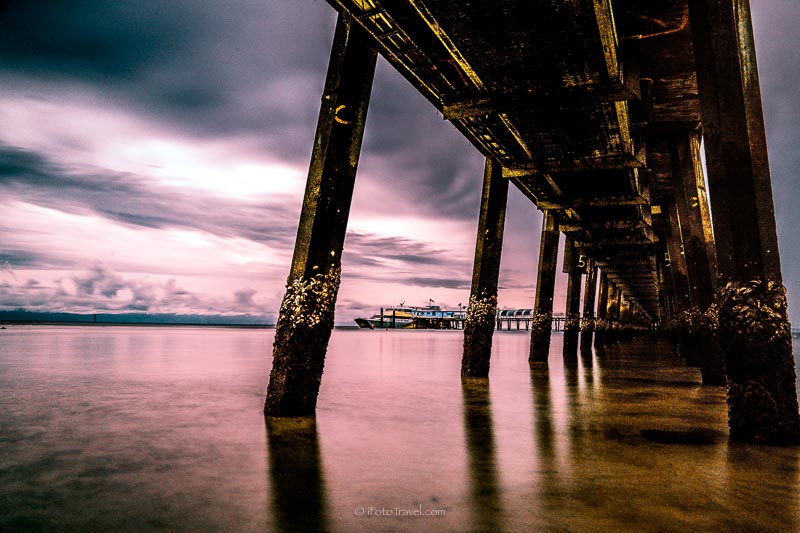
Green Island is a true sand cay and the only one bearing a rainforest.
Formed on top of existing reef structures about 6000 years ago, secondary wave action over time created a sand island.
Seabird poo cemented the sand providing nutrient for germinating seeds drifting to the island.
Green Island Facts and Figures
Only 27km from Cairns, Green Island Great Barrier Reef is an excellent destination for day trips as well as long stay resort guests.
Four metres above sea level Green Island is only one of 300 sand cay islands on the Great Barrier Reef with its own rainforest.
6000 years in creation, it is 660 x 260m in size or 12 hectares, of which 7.93 hectares are National Park.
In comparison, its surrounding reef covers 1200 hectares.
Commercial activities on the island are regulated and protected by National Park permits.
Meanwhile, the reef and underwater habitats are part of the Great Barrier Reef Marine Park.
Both Green Island and the reef come under the Great Barrier Reef World Heritage Area protected by UNESCO.
So, whilst Green Island may be small, it has much on offer.
Green Island is one of several islands in Queensland.
There are several in Tropical North Queensland.
Here’s a review of the differences between Green Island and Fitzroy Island.
When visiting Green Island, you will most likely pass through Cairns. Check out these things to do in Cairns. It’s worth spending a bit of time exploring the sights, such as the Cairns Aquarium and other attractions in the region such as Kuranda Village, the Tolga Bat Hospital and Paronella Park.
Beautiful Green Island Beaches
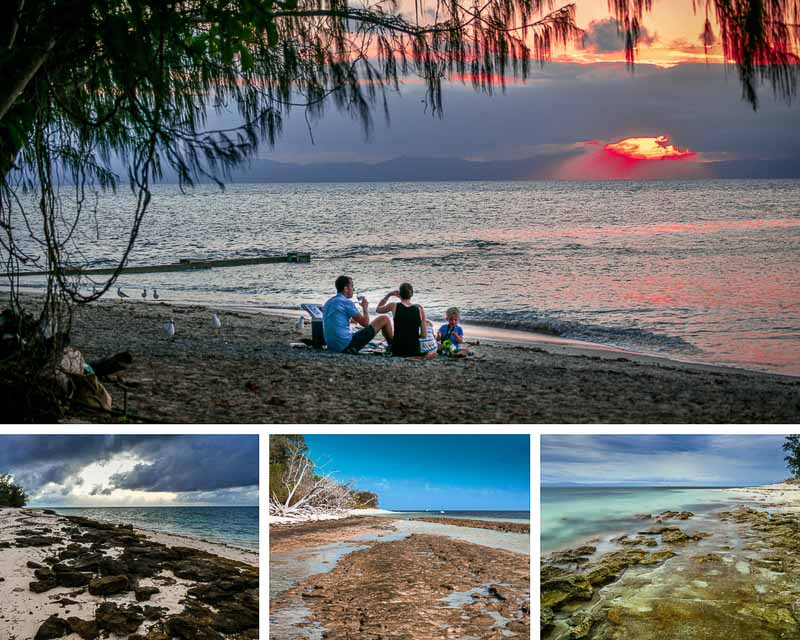
Less than an hour is all that it takes to leisurely stroll around Green Island’s 1.6km circumference.
Surrounded by beautiful tropical sand and fine coral beach, there are two main beach areas close to the jetty.
Those seeking sunbaking and fun in the sun can enjoy sun lounges, beach umbrellas, and beach volleyball.
But there are many more secluded spots all around the island.
Crystal clear warm waters are very inviting.
The generally calm and flat seas well suit novice swimmers and children.
Green Island snorkelling
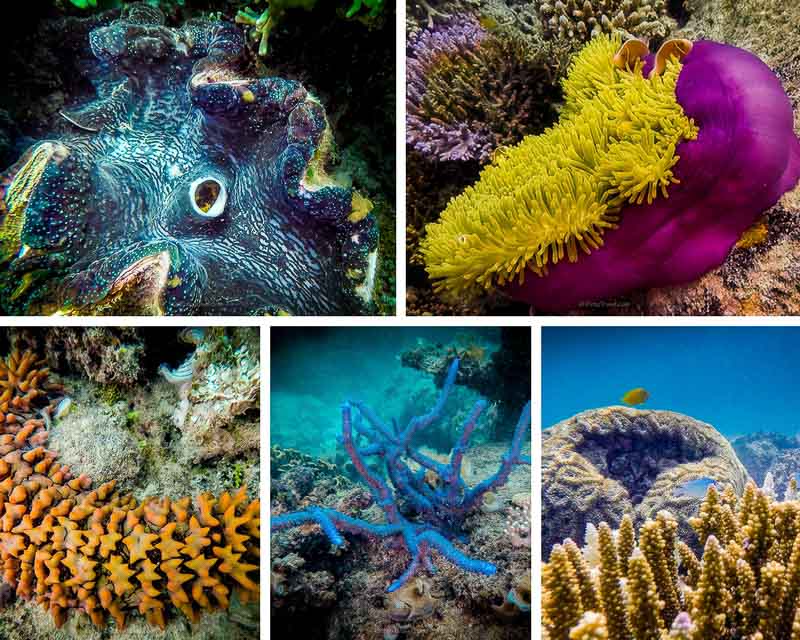
As Green Island is surrounded by an in-shore patch reef, it was perfect for the world’s first Underwater Observatory.
This was built in 1954 on Green Island and still exists today at the end of the jetty.
Marine life abounds with daily sightings of turtles, reef sharks, rays and tropical fish.
Coral and fish are close to shore, especially around the jetty and old underwater observatory.
Green Island snorkelling is thus very easy from the beach.
On an incoming tide, we saw two rare epaulettes or ’walking’ sharks along beach rocks.
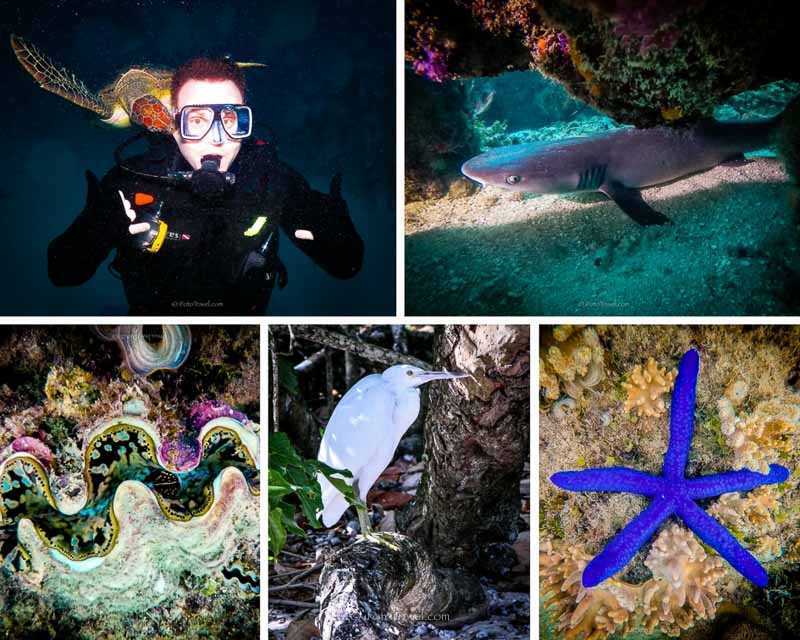
As well as natural wonders, a Green Island day trip offers visitors their own tropical beachside pool, a small boutique and massage centre, and a choice of eateries, bar, and restaurant.
Two marine habitats include seagrass beds near the shoreline which support juvenile fish, feeding turtles and an occasional dugong.
The reef begins in the shallows of the beach and continues out to deeper waters.
With over 190 types of hard corals and 100 types of soft coral, there is abundant marine life.
Boulder and staghorn corals, anemones, clown fish, parrot fish, turtles are to name a few.
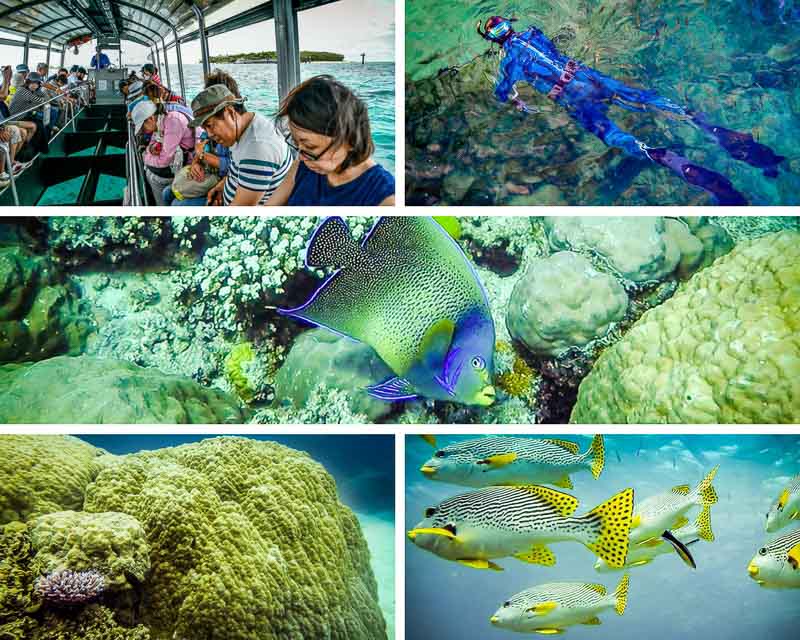
Home of the world’s very first glass bottom boat in 1937, modern day vessels cruise the crystal clear shallow waters to reveal the colourful underwater world of this inshore reef.
You can also snorkel at your leisure or scuba dive with the Green Island Dive Shop.
Green Island day trips
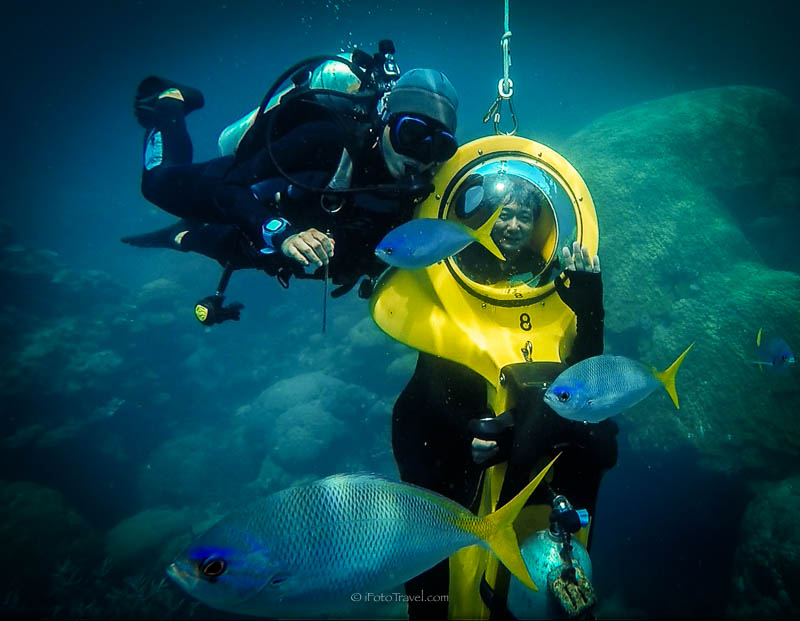
Day trips to the Outer Great Barrier Reef are available to experience cooler waters and very colourful larger coral reefs.
You can fly over the reef in a helicopter for that unique bird’s eye view.
Non-swimmers can try the fun ‘Scuba Doo’ self-drive underwater tour system.
Green Island Flora And Fauna
The coastline of Green Island is scrubby coastal vegetation but a few metres inland is a dense shady vine thicket tropical rainforest.
An easy boardwalk spans the length of the island.
There are eco-interpretive signs along the way detailing the island’s fascinating history and its Aboriginal roots.
Along the way, you may see some of the 120 plant species and fauna.
Sheoaks, pandanus, beach almond and box fruit are a few of the island trees.
Plus a few historically introduced coconut trees date back to 1889, planted to sustain shipwrecked sailors.
Land, sea and migratory birds pass through the Great Barrier Reef looking for nesting grounds.
Over 55 species use Green Island at some time or another as their home.
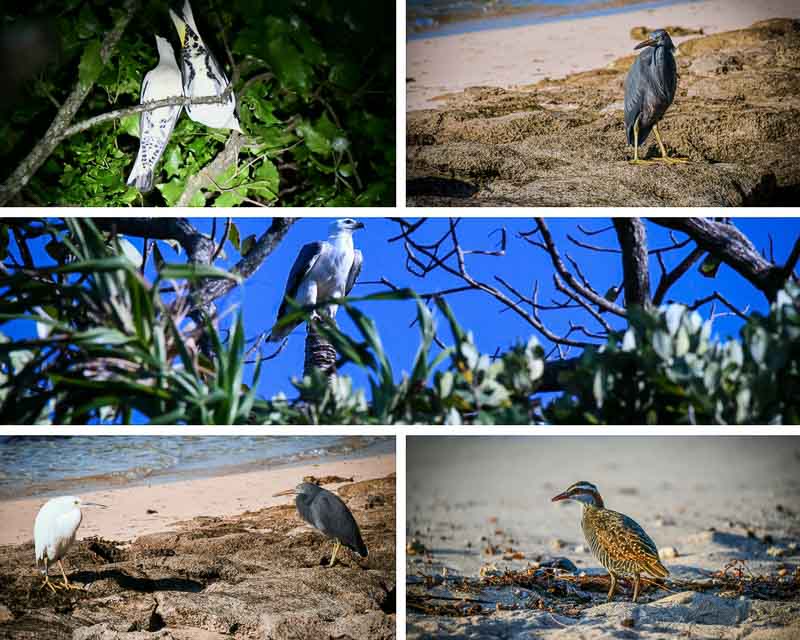
The commonest birds are probably the Buff-banded rails and the grey and white reef herons.
These have acclimatised nicely to sharing their space with we humans.
So much so the Green Island Resort has a specific Buff-banded rail management scheme to combat their cheeky nature of stealing food from the cafes and restaurant!
Migratory pied imperial pigeons are not uncommon and if lucky, you may even spot one of the two resident ospreys in their high nest or out hunting.
The island is quite small but immersed in wildlife.
You can walk around it under an hour, with various inland paths accessing the different beaches.
There are free, daily guided nature walks and tours.
The Interesting History Of Green Island
It is worth noting a little about the history of Green Island as not many people know that it lays claim to many ‘world firsts’.
It was named Green Island after Captain James Cook’s astronomer, Mr Charles Green in 1770.
Prior to that, a strong and proud Aboriginal history dates back to the 1700s when Green Island was used for fishing, hunting and manhood ceremonies.
Tourism on the Great Barrier Reef actually began on Green Island in the 1880s.
- Starting off with a few Fijian-style huts for fishers, occasional pleasure cruises ran out of Cairns in 1890.
- In 1929 Hayles (now Great Adventures) began a regular ferry service to Green Island and later built a small-scale hotel in 1942.
- The Green Island Great Barrier Reef Movie Theatre was opened by the Monkman’s in 1961. It became the world’s first island movie theatre.
- Then 1963 saw the hotel renovated as the Green Island Reef Resort.
- Redevelopment of Green Island Resort started in 1992 with day facilities created and a new luxury resort opened in 1994.
- 1924 heralded the beginnings of a holiday resort, with Green Island launching the world’s first glass bottom boat in 1937.
- In 1954, the world’s first underwater observatory was built on the island which still remains there today.
- Finally, Green Island built the world’s first island movie theatre in 1961, showcasing the earliest 1930’s historical underwater films of Noel and Kitty Monkman.
Marineland Melanesia
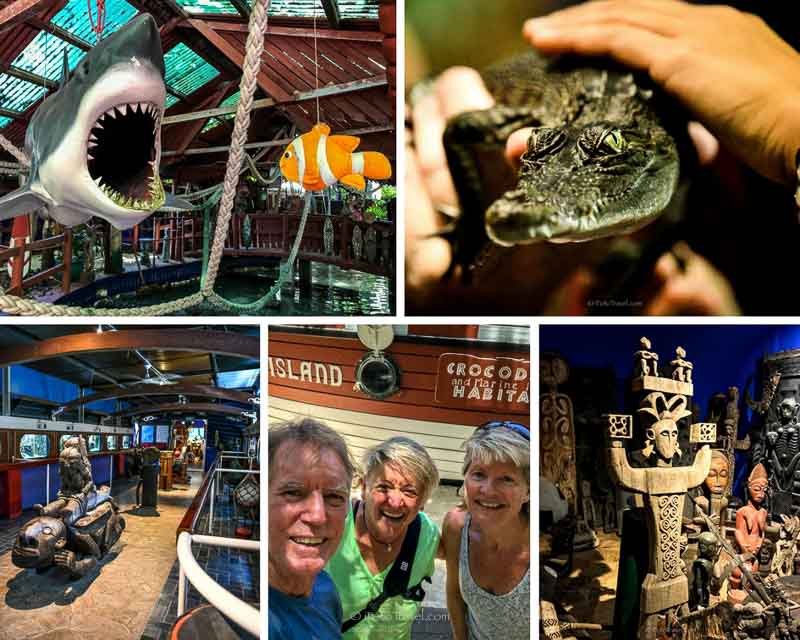
A Crocodile Farm opened in 1964 and was re-named Marineland Melanesia in 1972, making Green Island the only island in the Great Barrier Reef to have its own crocodile zoo.
Marineland Melanesia is still privately owned and run by the Craig family.
Grandparents George and Shirley Craig spent their early years in Papua New Guinea and many of their personal and original Melanesian artifacts and relics adorn Marineland.
This family business is a time warp back to the ’80s and is definitely worth a visit.
Not only is it a historical museum to a bygone time, third generations Sue and Steve live in and still operate the zoo and their gift shop, along with their children.
The Crocodile Habitat is home to the world’s largest living ‘saltie’, Cassius Crocodile and is well worth seeing!
Of the dozen or more crocodiles from Australia and PNG, Cassius is the largest croc in captivity in the world.
At 5.28m and about 113 years old, he sets the record and is still looking good!
Daily tours offer croc feeding and photo opportunities for both large and baby crocs.
Green Island Ecotourism
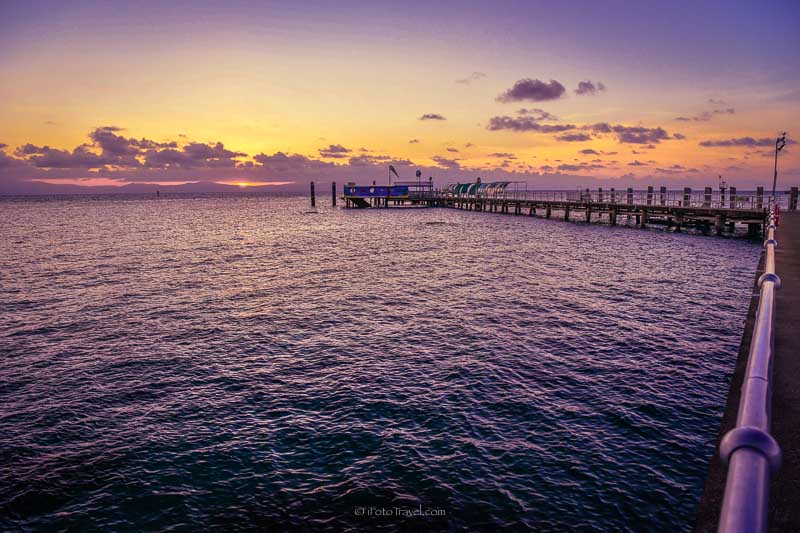
In a bid to make Green Island a flagship for Queensland ecotourism, owner’s Daikyo in 1990 built Australia’s first island tertiary sewage treatment plant.
It was first of its kind and ‘state of the art’ at the time.
It gained many environmental awards by minimising the impact on the reef using a biological system of UV radiation and sand filters.
Continuing on the same sustainable theme, there are no natural rivers or springs on Green Island.
All freshwater on the island comes from rain.
Rainwater feeds the rainforest and island plants.
So to minimise the impact on the island, potable water was brought to the island until 2001.
The Green Island Resort desalination plant was developed and became operational in 2001 providing water to the whole island.
As a reverse-osmosis desalination plant, it currently produces 60,000 litres of water a day, or 3000 litres per hour.
The only waste product is hyper-saline brine which is discharged through the tertiary sewage treatment outfall pipe.
Green Island Resort
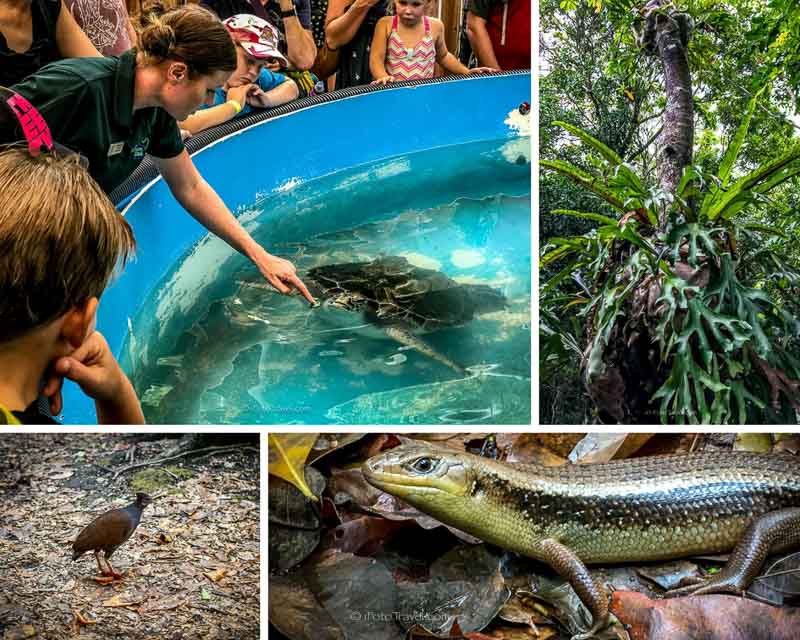
For longer stay guests, Green Island accommodation comprises luxury apartments nestled in the rainforest with a private secluded pool.
Additional to the island’s general facilities are complimentary late afternoon fish feeding, sunset drinks and nocturnal guided nature tours for guests.
The resort has a strong commitment to preserving the rainforest and surrounding reef.
As such, it is a world class eco-sensitive resort and has won many well-deserved awards including Advanced Ecotourism Certificate.
Actually, Green Island Resort was constructed with eco-tourism in mind.
It is based on best practice for construction design, choice of construction materials, appearance, landscaping, litter management and resource recovery.
Steep roof designs to allow free flow of rainwater onto the island ground.
Elevated boardwalks to allow animals to move along the forest floor minimising interference with tree root systems.
All service pipes and wiring are also hidden from view.
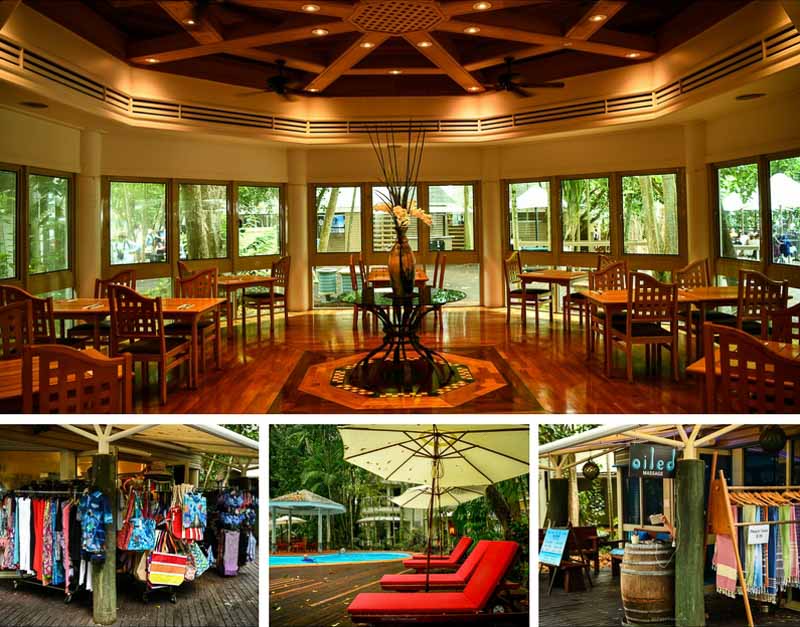
At Green Island Resort, building materials complement the natural rainforest surroundings, including sympathetic colour choices.
The two swimming pools are only 2.2m deep so as not to encroach on the natural freshwater table or lens of the island.
Landscaping includes only plants native to the island-grown from seed, with imported exotic plants strictly regulated and kept only in pots.
Green Island Awards
Quite deservingly, Green Island has won many awards.
From Top Luxury and Deluxe Island Accommodation as well as Customer Service Awards to Ecotourism Certification, Cleanest Beach, Litter Prevention, Resource Recovery, Waste Management, Environmental Protection and Best Environmental Practice Awards.
So you can see there is much more to Green Island than meets the eye.
With all of this as well as boutique shops, cafes, a top restaurant and a crocodile farm is Green Island worth a visit?
Absolutely!
There is certainly something for everyone.
And the best bit?
It’s all available with minimal impact on one of Australia’s best natural assets, our World Heritage Listed Great Barrier Reef.
What more could anyone ask for?
Fitzroy Island
Fitzroy Island, on the other hand, is a continental island, once connected to the mainland over 10,000 years ago.
Even today it gets most of its water from a natural spring originating in the Atherton Tablelands which surfaces behind the island’s resort.
Fitzroy Island history
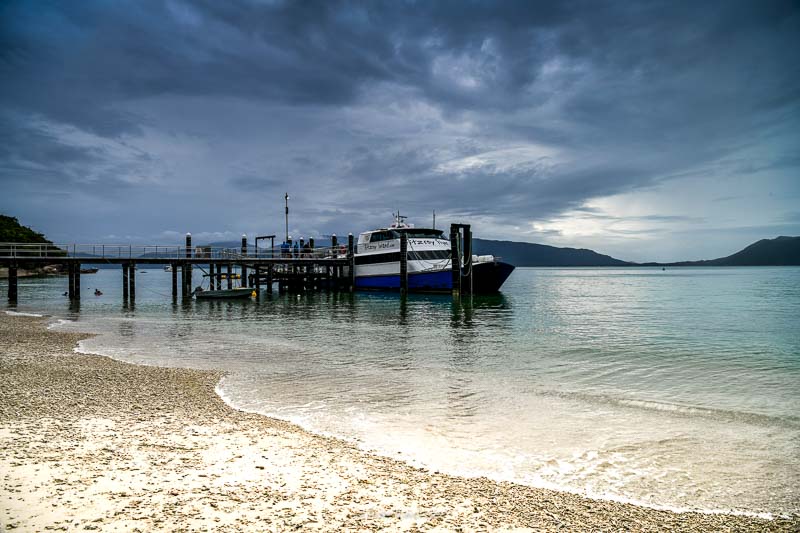
First named by James Cook in 1770, Fitzroy Island became a smallpox quarantine station for goldfield workers in 1876.
Later it was used as an Aboriginal mission for growing fruit and vegetables.
During the Second World War, Fitzroy Island was used for Radar Stations and became home to Air Force and Navy Units monitoring Grafton Passage for enemy boats.
A lighthouse was built then but replaced with another in the 1970s, which still stands today although was closed in 1992.
However, it is the geological origins of Fitzroy Island that create a different island topography to Green Island.
Huge granite outcrops, open woodlands, rainforest, mangroves as well as white coral beaches are its features.
Fitzroy Island Resort
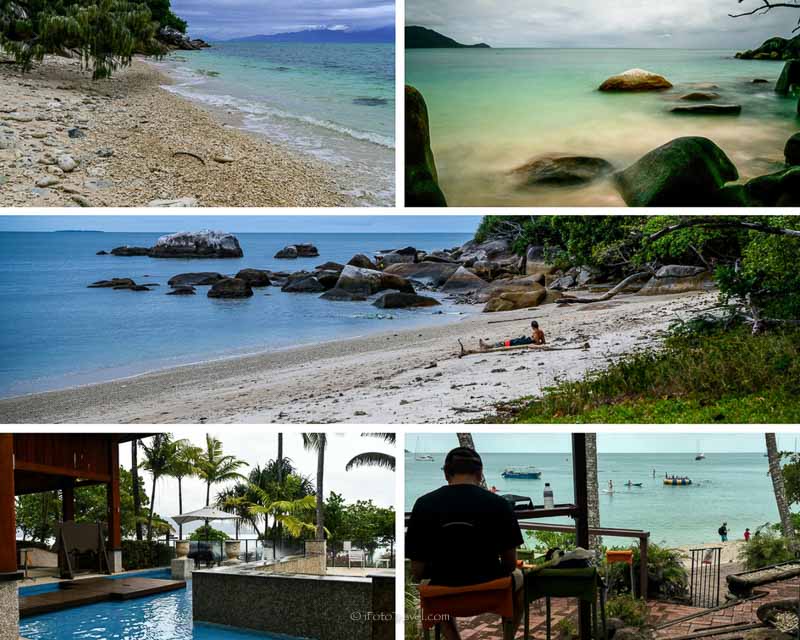
As you approach the island to hook up to the small jetty, Fitzroy Island Resort overlooks the protected calm Welcome Bay, popular with boaties, divers and fishermen.
The recently renovated resort offers various styles of accommodation including luxury rooms, cabins and self-contained apartments.
There’s a beachside restaurant, large pool, swim up bar, dive shop and an indoor cinema.
Fitzroy Island camping is also a great way to experience the island, with a small General Store selling everyday provisions.
However, the only real place for food and drink for visitors on Fitzroy Island day trip is the rather dated 80’s Foxy’s Bar & Grill.
While a throwback to another time, it plays great 80’s music as well as serving good food, but is in desperate need of a renovation.
Nonetheless, the bar is beachside and still proves very popular.
For a small fee, Guided Eco Walks take you through the Fitzroy Island resort grounds covering topics such as plant ecology or their traditional bush use.
Fitzroy Island Activities
Fitzroy Island activities include sun baking or snorkelling in warm calm tropical waters.
There are coral formations just offshore but king tides are a factor here, with some tides too low to enter or exit the water safely without damaging the coral.
The best Fitzroy Island snorkelling areas are between the Resort and White Rock, and around the rocks between Foxy’s bar and Nudey beach.
However, unlike Green Island, the water is rather milky with generally poor visibility.
You may be able to see a few fish or a rare turtle, especially near White Rock.
Note that stinger suits are essential from November to May.
Because of the poor water clarity and general lack of marine life, the resort offers extremely well-priced scuba diving, with dives from an unbelievable $20.
But this would best suit novice divers to practice basic skills, rather than hope to see the best the Great Barrier Reef can offer.
Fitzroy Island day trip
Nudey Beach is very popular if you’re after a Fitzroy Island day trip.
A well-loved coral beach, Nudey is a slightly secluded spot easily accessed by a pleasant 20-minute stroll through tropical rainforest.
It’s a sunbathing, swimming or snorkelling mecca.
Fitzroy Island National Park Walks
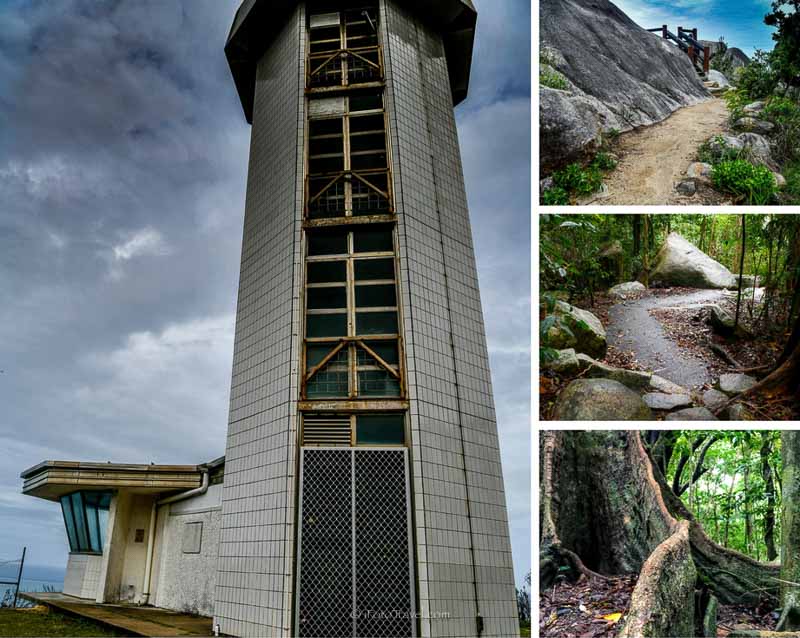
There are four more short nature walks on Fitzroy Island.
They can be a little challenging due to a vertical climb and rough ground.
So decent comfortable walking shoes are best, rather than ‘flip flops’ or thongs.
Take water, sunscreen and insect repellent with you, as well as a free walking map from the ferry staff or resort reception.
Secret Garden Track
A 45 minute, 1km round trip, this track starts from just behind Foxy’s Bar.
Don’t let the regular rustle of skinks scare you and be reassured, snakes are rarely seen!
The fauna of the walk is classic rainforest with an elevated boardwalk and deck at the end, where you can enjoy a moment or two in harmony with nature.
Summit Walk
The more challenging Summit Walk (269m high) offers spectacular scenery through woodland strewn with huge granite boulders.
However, from the path starting at the Campground, there are 996 steps.
At the top are 360-degree views of the island, mainland, and surrounding reefs.
Lighthouse Track
This has the reputation of being the hardest track on the island, however, local advice is to do the full 2.5-hour circuit.
First, climb the Summit as it is downhill to the Lighthouse from there, with great views of Little Fitzroy Island, Grafton Passage and seasonal migrating whales.
If you only want to do the steep, concrete hill walk to the Lighthouse, give yourself 1.5 hours for a return trek.
Fitzroy Island Tours

Overall, wildlife on Fitzroy appears more scarce compared to Green Island.
We only saw a Brahminy kite, a few doves and scrub fowls in the campsite, along with many small skinks during our walks.
The island’s largest predator, the yellow-spotted monitor, remained elusive on our day visit to Fitzroy Island.
Returning from the Lighthouse to the Resort, the path takes you past the Cairns Turtle Rehabilitation Centre.
Tropical cyclones destroy seagrass habitats, and man-made factors such as ingestion of plastics or boat strike, seriously threaten turtles.
Starvation, injury and infection are their main issues.
Many sick and injured turtles are treated here, some transferred from Cairns.
Still recuperating from severe injuries or sickness, a few have been there for many years.
From 1 pm each day, there are regular short tours of this volunteer-run facility.
They are well worth doing, if only for the take-home message of what we can each do to improve their plight and numbers.
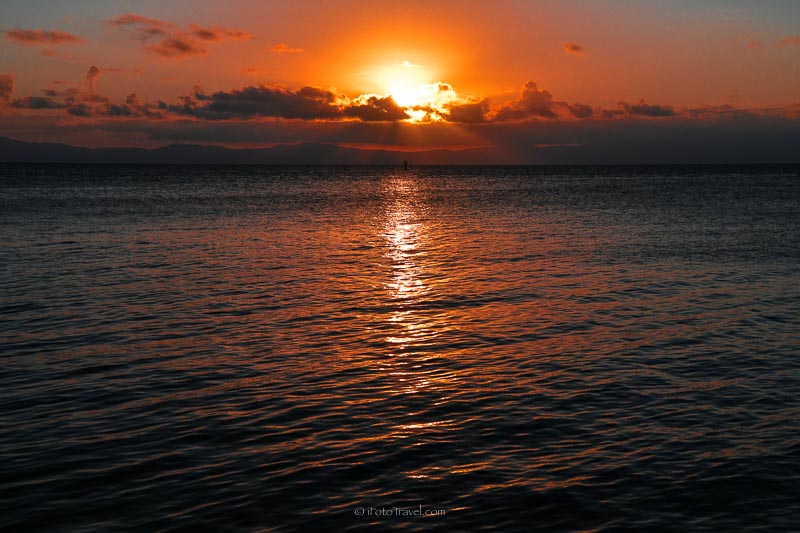
So, Green Island or Fitzroy Island? Take your pick, or, visit both and enjoy all that the Great Barrier Reef can offer island style!
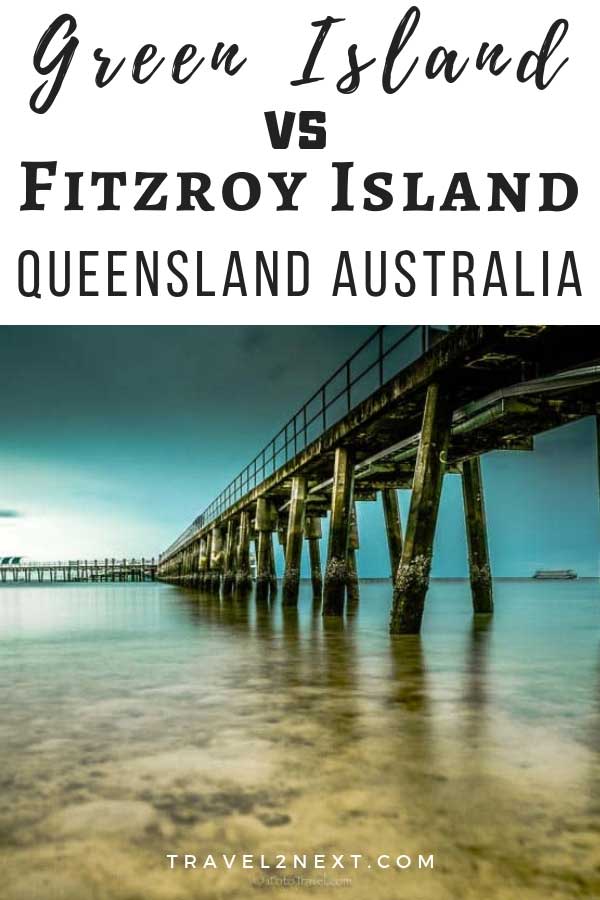
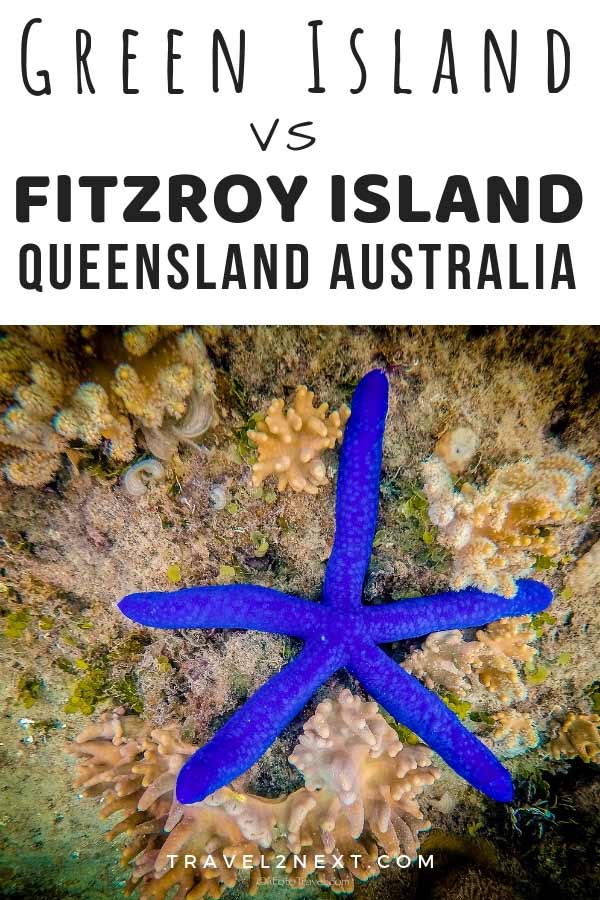
Plan Your Trip
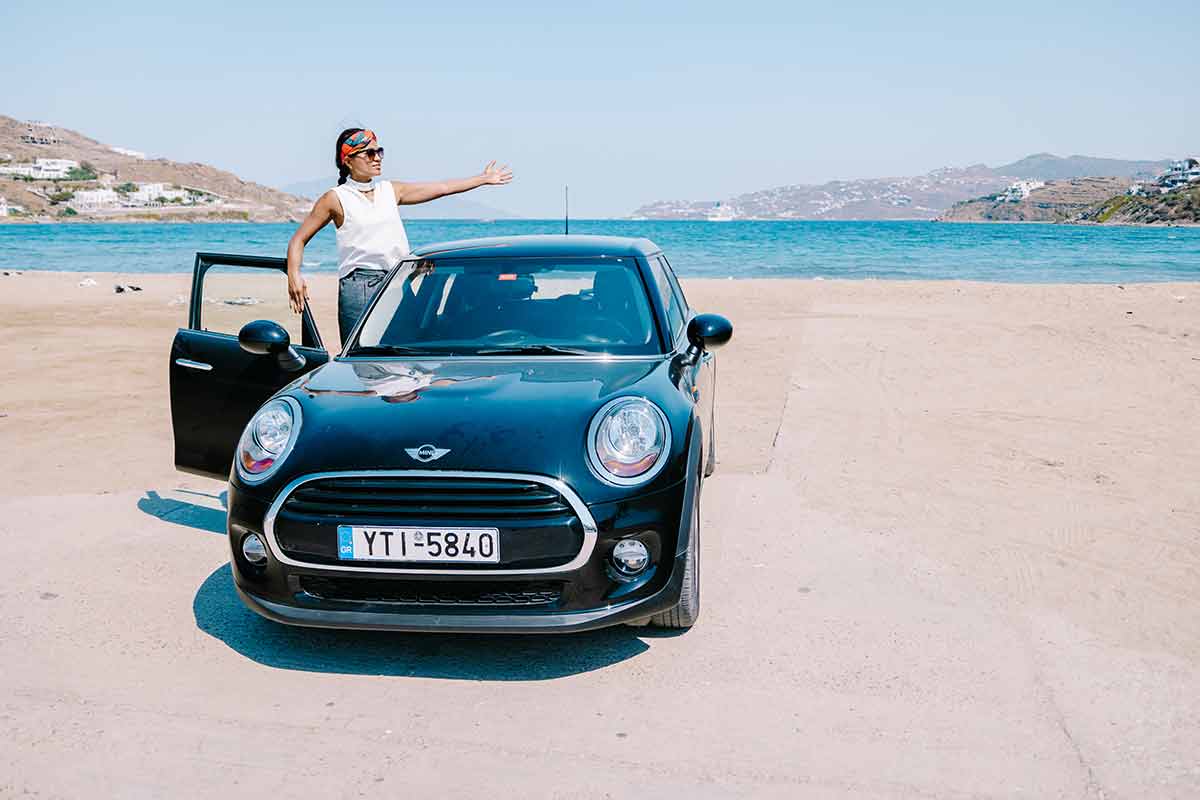
Rent A Car – Find the best car rental rates at Discover Cars. They compare car hire companies to provide you with the best deal right now.
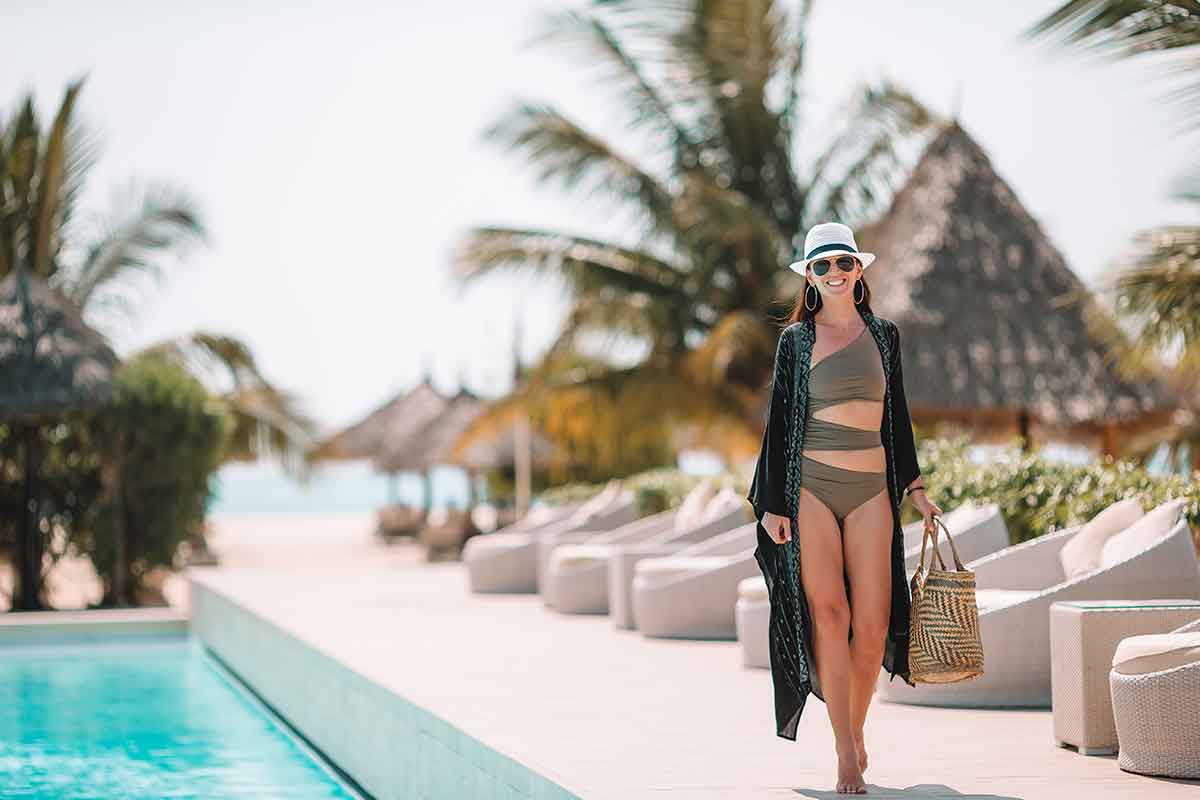
Find A Hotel – If you’re curious about this article and are looking for somewhere to stay, take a look at these amazing hotels.
